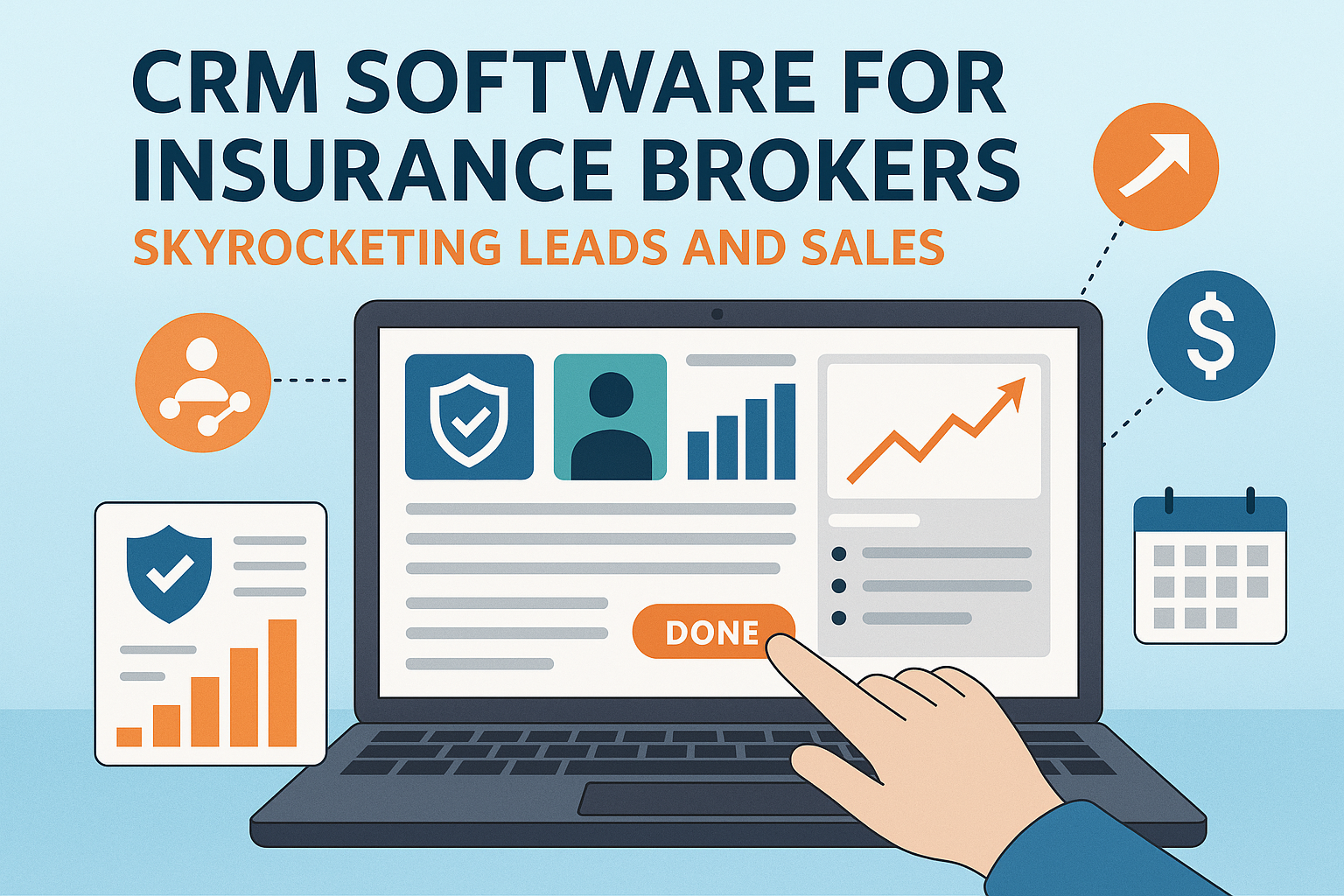In the fast-paced world of insurance brokerage, staying ahead of the competition requires more than just industry expertise it demands efficient management of leads, clients, and sales processes. Enter CRM (Customer Relationship Management) software, a game-changer for insurance brokers looking to streamline operations, nurture leads, and close more deals. This blog explores how CRM software empowers insurance brokers to maximize leads and boost sales, tailored for global audiences seeking scalable solutions.
Why Insurance Brokers Need CRM Software
Insurance brokers juggle multiple tasks daily connecting with prospects, managing client policies, tracking renewals, and closing sales. A robust CRM system centralizes these tasks, offering a unified platform to manage relationships and drive growth. Here’s why CRM is a must-have:
- Lead Management: Capture and organize leads from multiple sources website forms, referrals, or social media ensuring no opportunity slips through the cracks.
- Client Retention: Track client interactions, policy details, and renewal dates to provide personalized service and build long-term relationships.
- Sales Automation: Automate repetitive tasks like follow-up emails or reminders, freeing up time to focus on closing deals.
- Data-Driven Insights: Analyze sales trends, lead conversion rates, and client preferences to make informed decisions.
Key Features of CRM Software for Insurance Brokers
Not all CRM systems are created equal. For insurance brokers, the right CRM should cater to the unique demands of the industry. Here are essential features to look for:
1. Lead Scoring and Prioritization
Effective lead management starts with identifying high-potential prospects. CRM tools with lead scoring assign values to leads based on their behavior, demographics, or engagement level. This allows brokers to prioritize hot leads, ensuring timely follow-ups and higher conversion rates.
2. Policy and Renewal Tracking
A CRM designed for insurance brokers should include tools to manage policies, track renewal dates, and send automated reminders. This ensures clients never miss renewals, enhancing satisfaction and retention.
3. Seamless Communication Tools
Integrated email, SMS, and calling features enable brokers to communicate with clients directly from the CRM. Personalized templates and automated drip campaigns nurture leads without manual effort.
4. Analytics and Reporting
Advanced analytics provide insights into sales performance, lead sources, and client behavior. Customizable dashboards help brokers monitor key metrics like conversion rates, revenue growth, and pipeline health.
5. Integration with Insurance Tools
The best CRMs integrate with industry-specific tools like quoting engines, underwriting platforms, or compliance software, creating a seamless workflow for brokers.
6. Mobile Accessibility
Brokers are often on the go. A mobile-friendly CRM allows access to client data, lead updates, and tasks from anywhere, ensuring productivity even outside the office.
Benefits of Using CRM Software for Insurance Brokers
Implementing a CRM system offers tangible benefits that directly impact lead generation and sales:
- Increased Efficiency: Automating routine tasks like data entry or follow-ups saves time and reduces errors.
- Improved Lead Conversion: Targeted nurturing and timely follow-ups turn prospects into clients faster.
- Enhanced Client Experience: Personalized communication and proactive service build trust and loyalty.
- Scalable Growth: As your brokerage grows, a CRM adapts to handle larger client bases and complex sales funnels.
- Competitive Edge: Brokers using CRM can outpace competitors by leveraging data-driven strategies and automation.
How to Choose the Right CRM for Your Brokerage
Selecting the perfect CRM requires careful consideration of your business needs. Here’s a quick guide:
- Assess Your Needs: Identify pain points in your current process lead leakage, missed renewals, or lack of analytics and prioritize features that address them.
- Scalability: Choose a CRM that grows with your business, supporting more users and advanced features as needed.
- Ease of Use: A user-friendly interface ensures your team adopts the system quickly, minimizing training time.
- Integration Capabilities: Ensure the CRM integrates with your existing tools, such as email platforms or insurance software.
- Budget-Friendly Options: Look for cost-effective plans with flexible pricing to suit your brokerage’s size and goals.
Real-World Impact of CRM on Insurance Brokerages
Imagine a brokerage struggling with scattered client data and missed follow-ups. By implementing a CRM, they centralize client information, automate follow-up emails, and use analytics to identify high-value leads. Within months, they see a 30% increase in lead conversions and a 20% boost in client retention. This isn’t just theory CRMs deliver measurable results for brokers worldwide.
Getting Started with CRM Software
Ready to transform your brokerage? Follow these steps:
- Research Top CRMs: Explore platforms like Salesforce, HubSpot, or industry-specific options like AgencyBloc or Zoho CRM.
- Request Demos: Test-drive CRMs to see how they fit your workflow.
- Train Your Team: Invest in onboarding to ensure smooth adoption.
- Monitor and Optimize: Regularly review analytics to fine-tune your CRM strategy.
Conclusion
CRM software is no longer a luxury it’s a necessity for insurance brokers aiming to maximize leads and skyrocket sales. By streamlining lead management, automating tasks, and delivering personalized client experiences, a CRM empowers brokers to thrive in a competitive market. Whether you’re a solo broker or managing a large team, investing in the right CRM can unlock unparalleled growth and efficiency.
Take the first step today: explore CRM options, align them with your goals, and watch your brokerage soar to new heights.

